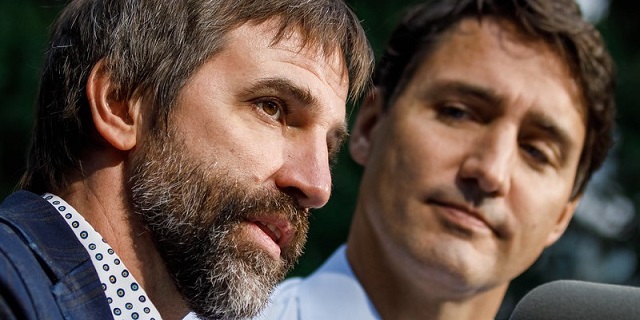Economy
Ottawa should abandon unfeasible and damaging ‘net-zero’ plan

From the Fraser Institute
A high-power AI chip uses as much electricity per year as three electric vehicles (and by the way, one EV per household would double residential electricity demand)
According to the Trudeau government’s plan, Canada will reduce greenhouse gas emissions to “net-zero” by 2050, largely by “phasing out unabated fossil fuels.” But given current technologies, virtually all fossil fuels are “unabated”—that is, they generate greenhouse gases when burned. So basically, the plan is to phase-out fossil fuel use, use wind and solar power to power our lives, and transition to electric vehicles.
But this plan is simply not feasible.
In a recent study, Vaclav Smil, professor emeritus at the University of Manitoba, spotlights some uncomfortable realities. Since the Kyoto Protocol was enacted in 1997, essentially setting the world on the path to net-zero, global fossil fuel consumption has surged by 55 per cent. And the share of fossil fuels in global energy consumption has barely decreased from 86 per cent to 82 per cent. In other words, writes Smil, “by 2023, after a quarter century of targeted energy transition, there has been no absolute global decarbonization of energy supply. Just the opposite. In that quarter century, the world has substantially increased its dependence on fossil carbon.” It’s worth noting that Smil is not some “climate denier”—he’s a strong believer in manmade climate change, and sees it as a serious danger to humanity.
In another recent article, Mark Mills, renowned energy policy analyst, boldly declares, “The Energy Transition Won’t Happen,” in part because developments in computing technologies such as cloud computing and artificial intelligence (AI) will require more energy than ever before, “shattering any illusion that we will restrict supplies.” Mills provides some eye-popping examples of how cloud and AI will suck up vast amounts of energy. A high-power AI chip uses as much electricity per year as three electric vehicles (and by the way, one EV per household would double residential electricity demand).
And chip-maker Nvidia, Mills observes, produced some five million such chips in the last three years, and market demand for them is soaring. The appetite for AI chips is “explosive and essentially unlimited.” The data centres that power cloud computing are also mind-boggling in their energy use, each with an energy appetite often greater than skyscrapers the size of the Empire State Building. The largest data centres consume more energy than a steel mill. And the energy used to enable one hour of video (courtesy of all that cloud computing) is more than the share of fuel consumed by a single person on a 10-mile bus ride.
And yet, on the march towards the unreachable goal of net-zero, government policies have forced out coal-power generation in favour of more costly natural-gas power generation, significantly increasing Canadian’s energy costs. Shifting to lower-GHG energy generation has raised the cost of power, particularly in provinces dependent on fossil-fuel power, while the federal carbon tax drives up costs of energy production. And all at a time when significant numbers of Canadians are mired in energy poverty (when households must devote a significant share of their after-tax income to cover the cost of energy used for transportation, home heating and cooking).
No government should base public policy on wishful thinking or make arbitrary commitments to impossible outcomes. This type of policymaking leads to failure. The Trudeau government should abandon the net-zero by 2050 plan and the never-gonna-happen fossil fuel phase-out, and cease its economically damaging energy, tax and industrial policies it has deployed to further that agenda.
Author:
Economy
Trump opens door to Iranian oil exports

This article supplied by Troy Media.
U.S. President Donald Trump’s chaotic foreign policy is unravelling years of pressure on Iran and fuelling a surge of Iranian oil into global markets. His recent pivot to allow China to buy Iranian crude, despite previously trying to crush those exports, marks a sharp shift from strategic pressure to transactional diplomacy.
This unpredictability isn’t just confusing allies—it’s transforming global oil flows. One day, Trump vetoes an Israeli plan to assassinate Iran’s supreme leader, Ayatollah Khamenei. Days later, he calls for Iran’s unconditional surrender. After announcing a ceasefire between Iran, Israel and the United States, Trump praises both sides then lashes out at them the next day.
The biggest shock came when Trump posted on Truth Social that “China can now continue to purchase Oil from Iran. Hopefully, they will be purchasing plenty from the U.S., also.” The statement reversed the “maximum pressure” campaign he reinstated in February, which aimed to drive Iran’s oil exports to zero. The campaign reimposes sanctions on Tehran, threatening penalties on any country or company buying Iranian crude,
with the goal of crippling Iran’s economy and nuclear ambitions.
This wasn’t foreign policy—it was deal-making. Trump is brokering calm in the Middle East not for strategy, but to boost American oil sales to China. And in the process, he’s giving Iran room to move.
The effects of this shift in U.S. policy are already visible in trade data. Chinese imports of Iranian crude hit record levels in June. Ship-tracking firm Vortexa reported more than 1.8 million barrels per day imported between June 1 and 20. Kpler data, covering June 1 to 27, showed a 1.46 million bpd average, nearly 500,000 more than in May.
Much of the supply came from discounted May loadings destined for China’s independent refineries—the so-called “teapots”—stocking up ahead of peak summer demand. After hostilities broke out between Iran and Israel on June 12, Iran ramped up exports even further, increasing daily crude shipments by 44 per cent within a week.
Iran is under heavy U.S. sanctions, and its oil is typically sold at a discount, especially to China, the world’s largest oil importer. These discounted barrels undercut other exporters, including U.S. allies and global producers like Canada, reducing global prices and shifting power dynamics in the energy market.
All of this happened with full knowledge of the U.S. administration. Analysts now expect Iranian crude to continue flowing freely, as long as Trump sees strategic or economic value in it—though that position could reverse without warning.
Complicating matters is progress toward a U.S.-China trade deal. Commerce Secretary Howard Lutnick told reporters that an agreement reached in May has now been finalized. China later confirmed the understanding. Trump’s oil concession may be part of that broader détente, but it comes at the cost of any consistent pressure on Iran.
Meanwhile, despite Trump’s claims of obliterating Iran’s nuclear program, early reports suggest U.S. strikes merely delayed Tehran’s capabilities by a few months. The public posture of strength contrasts with a quieter reality: Iranian oil is once again flooding global markets.
With OPEC+ also boosting output monthly, there is no shortage of crude on the horizon. In fact, oversupply may once again define the market—and Trump’s erratic diplomacy is helping drive it.
For Canadian producers, especially in Alberta, the return of cheap Iranian oil can mean downward pressure on global prices and stiffer competition in key markets. And with global energy supply increasingly shaped by impulsive political decisions, Canada’s energy sector remains vulnerable to forces far beyond its borders.
This is the new reality: unpredictability at the top is shaping the oil market more than any cartel or conflict. And for now, Iran is winning.
Toronto-based Rashid Husain Syed is a highly regarded analyst specializing in energy and politics, particularly in the Middle East. In addition to his contributions to local and international newspapers, Rashid frequently lends his expertise as a speaker at global conferences. Organizations such as the Department of Energy in Washington and the International Energy Agency in Paris have sought his insights on global energy matters.
Troy Media empowers Canadian community news outlets by providing independent, insightful analysis and commentary. Our mission is to support local media in helping Canadians stay informed and engaged by delivering reliable content that strengthens community connections and deepens understanding across the country.
Alberta
Pierre Poilievre – Per Capita, Hardisty, Alberta Is the Most Important Little Town In Canada

From Pierre Poilievre
-

 Business1 day ago
Business1 day agoWhy it’s time to repeal the oil tanker ban on B.C.’s north coast
-

 Crime1 day ago
Crime1 day agoBryan Kohberger avoids death penalty in brutal killing of four Idaho students
-

 International2 days ago
International2 days agoCBS settles with Trump over doctored 60 Minutes Harris interview
-

 Energy1 day ago
Energy1 day agoIf Canada Wants to be the World’s Energy Partner, We Need to Act Like It
-

 Alberta1 day ago
Alberta1 day agoPierre Poilievre – Per Capita, Hardisty, Alberta Is the Most Important Little Town In Canada
-

 MxM News1 day ago
MxM News1 day agoUPenn strips Lia Thomas of women’s swimming titles after Title IX investigation
-

 Business1 day ago
Business1 day agoLatest shakedown attempt by Canada Post underscores need for privatization
-

 Alberta1 day ago
Alberta1 day agoAlberta Provincial Police – New chief of Independent Agency Police Service








